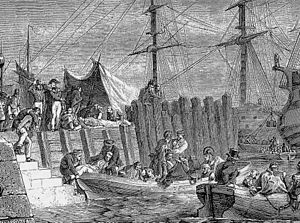Walcheren Expedition
| Walcheren Campaign | |||||||
|---|---|---|---|---|---|---|---|
| Part of the War of the Fifth Coalition | |||||||
 Illness-stricken British troops evacuating the island of Walcheren on 30 August. |
|||||||
|
|||||||
| Belligerents | |||||||
|
|
|
||||||
| Commanders and leaders | |||||||
|
|
|
||||||
| Strength | |||||||
| 20,000 | 40,000 | ||||||
| Casualties and losses | |||||||
| 4,000 dead, wounded or captured including 1st battalion, Irish legion 5,000+ sick |
4,000+ dead, wounded or captured 12,000+ sick |
||||||
The Walcheren Campaign was an unsuccessful British expedition to the Netherlands in 1809 intended to open another front in the Austrian Empire's struggle with France during the War of the Fifth Coalition. Around 40,000 soldiers, 15,000 horses together with field artillery and two siege trains crossed the North Sea and landed at Walcheren on 30 July. This was the largest British expedition of that year, larger than the army serving in the Peninsular War in Portugal. The Walcheren Campaign involved little fighting, but heavy losses from the sickness popularly dubbed "Walcheren Fever". Although more than 4,000 British troops died during the expedition, only 106 died in combat; the survivors withdrew on 9 December.
In July 1809, the British decided to seal the mouth of the Scheldt to prevent the port of Antwerp being used as a base against them. The primary aim of the campaign was to destroy the French fleet thought to be in Flushing whilst providing a diversion for the hard-pressed Austrians. However, the Battle of Wagram had already occurred before the start of the campaign and the Austrians had effectively already lost the war.
John Pitt, 2nd Earl of Chatham commanded the army, whilst Sir Richard Strachan commanded the navy. As a first move, the British seized the swampy island of Walcheren at the mouth of river Scheldt, as well as South Beveland island, both in the present-day Netherlands. The British troops soon began to suffer from malaria; within a month of seizing the island, they had over 8,000 fever cases. The medical provisions for the expedition proved inadequate despite reports that an occupying French force had lost 80% of its numbers a few years earlier, also due to disease. Once it had been decided to garrison Walcheren Island in September 1809, Pitt was replaced by Lieutenant-general Eyre Coote who in October was replaced by Lieutenant-general George Don.
...
Wikipedia
